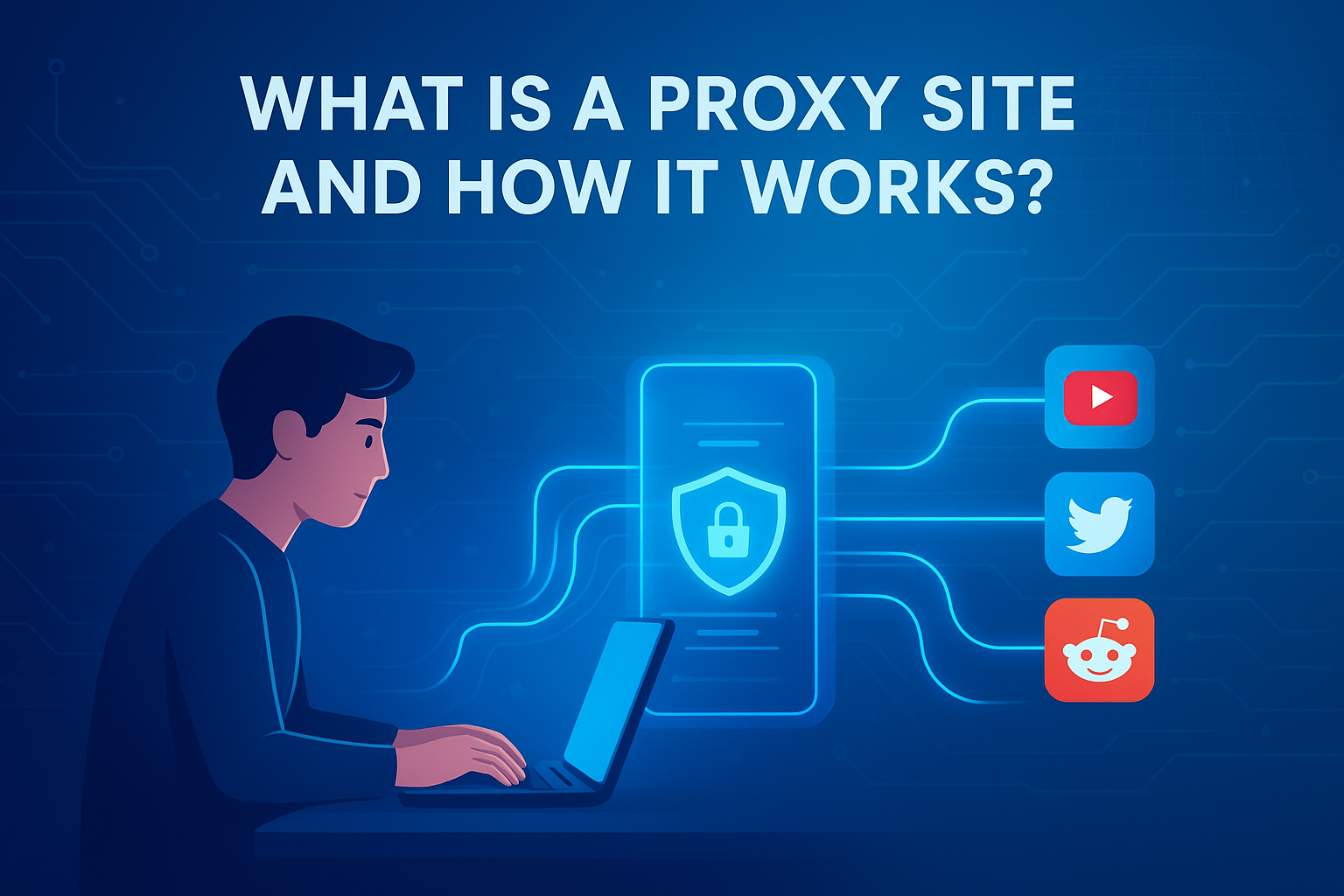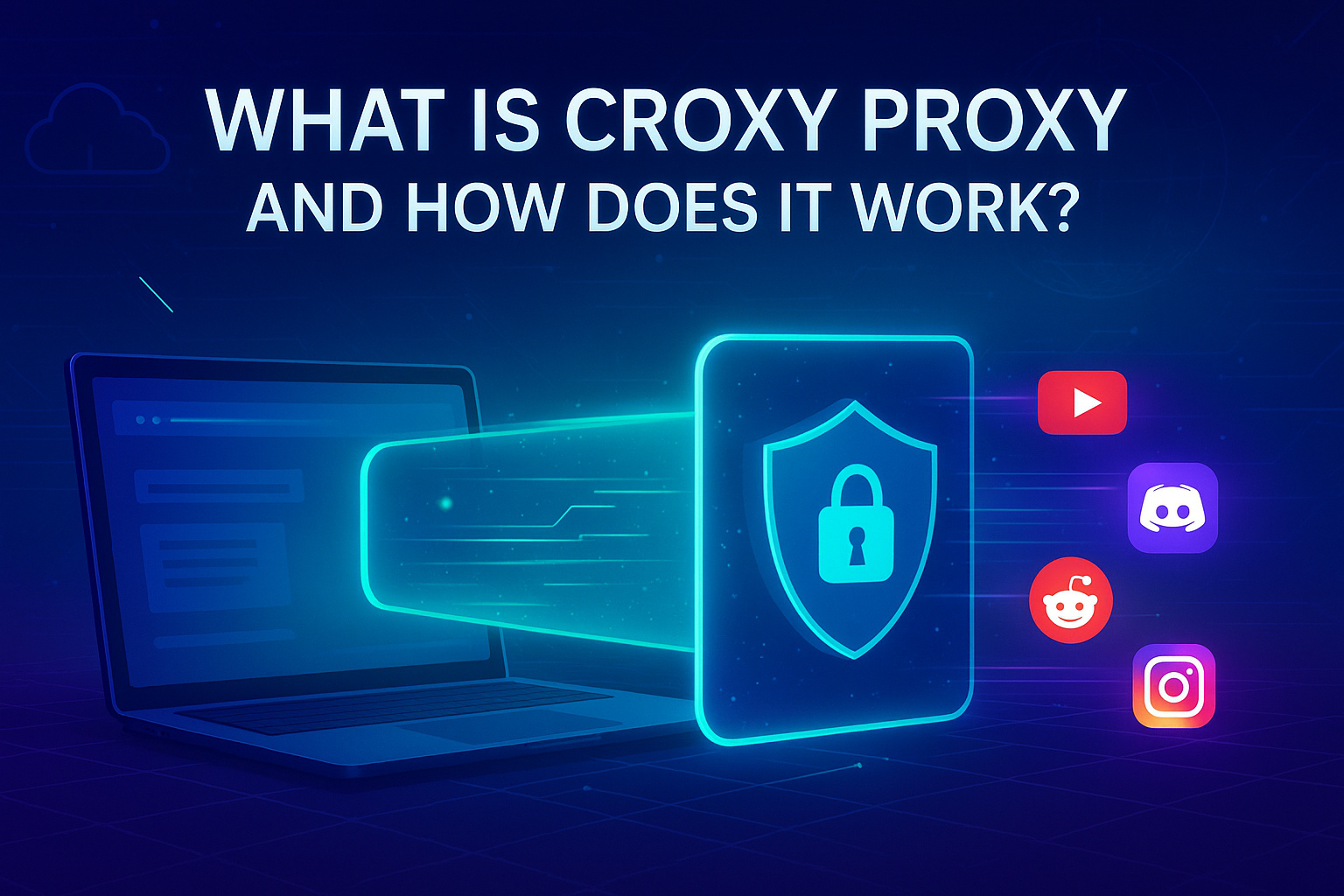Let’s face it — the internet isn’t as open as we imagine.
Some websites are blocked. Some services aren’t available in every country.
And sometimes, even your favorite app refuses to load because of network restrictions.
That’s where proxy sites step in — quietly, efficiently, and powerfully.
A proxy site works like a friendly middleman between you and the internet.
It helps you access blocked websites, maintain privacy, and browse securely — all without leaving a trace.
If you’ve ever wondered how it all works, you’re in the right place.
In this guide, we’ll break down what a proxy site is, how it operates, the different types available, and why using one (like Blockaway) can change the way you browse forever.
What Exactly Is a Proxy Site?
A proxy site is simply a gateway.
It sits between your device (like your laptop or phone) and the website you want to visit.
Instead of directly connecting to a website, your browser sends the request to the proxy.
The proxy then forwards that request to the website on your behalf.
Finally, it brings the website’s content back to you.
Think of it like sending a friend to the store to buy something for you.
The shopkeeper only sees your friend — not you.
That’s what a proxy does.
It hides your real identity online by masking your IP address — the digital ID that reveals your location and internet provider.
So when you use a proxy site like Blockaway, the websites you visit see the proxy’s IP, not yours.
This gives you privacy, anonymity, and access to places that might otherwise be off-limits.
The Simple Science Behind It: How a Proxy Site Works
Let’s break this down step by step.
- You enter a URL — For example, you type
www.youtube.comin Blockaway’s proxy bar. - The proxy receives your request — Blockaway takes that request but doesn’t send it straight away.
- It forwards the request — The proxy server then sends the request to YouTube’s servers on your behalf.
- YouTube responds — It sends the website’s data back to the proxy server.
- The proxy delivers it to you — Finally, Blockaway shows you YouTube’s page in your browser.
All this happens in seconds.
You see the website as if you were browsing normally — but your real identity stays hidden.
It’s like wearing an invisibility cloak while surfing the web.
Why People Use Proxy Sites
There are many reasons why people turn to proxy sites every day — and not just for unblocking Netflix or YouTube.
Let’s look at the top ones
1. To Unblock Restricted Websites
Schools, offices, or even governments sometimes block access to social media or entertainment sites.
A proxy site helps bypass those restrictions easily.
You can open Facebook, Twitter, or Discord even if the local network has them blocked.
2. To Maintain Privacy
When you use a proxy, your real IP stays hidden.
That means websites can’t track where you’re from, what you click, or how often you visit.
In short — you browse freely, without leaving a digital footprint.
3. To Access Region-Locked Content
Ever tried opening a video that says “This content isn’t available in your country”?
Frustrating, right?
Proxies can make it look like you’re browsing from another location — helping you access global content without restrictions.
4. To Save Bandwidth and Improve Speed
Some advanced proxy servers cache (store) frequently visited pages.
So, when multiple users request the same page, it loads faster because it’s already stored locally.
5. To Protect from Cyber Threats
Proxy sites can act as shields between your system and potential threats on the internet.
They filter harmful traffic, stop tracking scripts, and sometimes even block ads.
In short — proxy sites are not just about freedom.
They’re about safety and control too.
Different Types of Proxy Sites
Not all proxies are created equal.
Each type has a unique purpose, depending on what you need.
Let’s explore the most common ones
1. HTTP Proxy
This is the most common proxy type used for browsing websites.
It handles all web traffic and is perfect for unblocking sites and improving privacy online.
2. HTTPS Proxy
An advanced version of HTTP, this proxy adds encryption.
It’s more secure and prevents data theft or eavesdropping — ideal for when you’re entering passwords or personal details.
3. SOCKS Proxy
This proxy can handle all kinds of traffic — not just web pages.
It’s useful for video streaming, file transfers, and even gaming.
4. Transparent Proxy
Used mostly by companies or schools to monitor or restrict access.
It doesn’t hide your IP but filters what you can access.
5. Anonymous Proxy
This one hides your IP but still identifies itself as a proxy to the website.
It offers basic privacy but isn’t fully undetectable.
6. Elite or High-Anonymity Proxy
The most private and secure type.
It hides your IP and doesn’t reveal that you’re using a proxy at all.
Blockaway uses this level of anonymity for smooth and safe browsing.
How Proxy Sites Differ from VPNs
Many people confuse proxies and VPNs — and it’s easy to see why.
Both hide your IP and help access blocked content.
But under the hood, they work very differently.
| Feature | Proxy Site | VPN |
|---|---|---|
| Speed | Generally faster for browsing | Slower due to encryption |
| Encryption | May or may not encrypt | Always encrypts |
| Scope | Works per app or browser | Works system-wide |
| Cost | Usually free (like Blockaway) | Often paid |
| Setup | No installation needed | Needs app or configuration |
Real-Life Examples of Proxy Site Use
Let’s take a few scenarios to see how proxies make a difference in daily life.
Case 1: The Student at School
Riya loves music, but her school blocks Spotify and YouTube.
During breaks, she uses Blockaway to access her favorite playlists without breaking any device rules.
Case 2: The Remote Worker
Arjun works for a global company.
He needs to access content from multiple regions to test his marketing campaigns.
Using a proxy, he switches between locations in seconds — no hassle, no extra software.
Case 3: The Privacy Lover
Maya simply doesn’t want companies tracking her every move.
She uses a proxy every time she shops online to avoid targeted ads and unwanted cookies.
Each story is different — but the solution remains the same: a reliable proxy site.
The Technical Side (Made Simple)
Let’s go a bit deeper — but in simple terms.
A proxy server operates at Layer 7 (Application Layer) of the OSI model.
It intercepts outgoing requests from your browser and decides what to do next — forward, modify, or block.
Here’s what happens inside:
- DNS Request: When you type a URL, your system sends a DNS request to find the website’s IP.
- Proxy Intercept: The proxy captures that request and sends it through its own DNS servers.
- IP Masking: Your IP is replaced with the proxy’s IP.
- Connection Established: The proxy connects to the destination site.
- Response Forwarding: The data is sent back to you through the same secure channel.
You stay hidden.
Your connection stays smooth.
And your browsing experience becomes private.
Benefits of Using Blockaway Proxy Site
Blockaway isn’t just another proxy.
It’s built for speed, simplicity, and security.
Here’s why users love it 👇
1. No Installation Needed
Just open the Blockaway website, type the URL you want, and go.
No apps, no extensions — just instant access.
2. Works on All Devices
Whether you’re on Windows, macOS, Android, or iPhone, it runs perfectly in your browser.
3. Free and Fast
Unlike many proxies that slow down, Blockaway’s servers are optimized for high-speed connections.
4. Secure Browsing
It uses SSL encryption (HTTPS) to ensure your connection stays safe from prying eyes.
5. No Logs Policy
Blockaway doesn’t track or record what you browse.
Your privacy truly remains yours.
6. Access Global Content
From Netflix and YouTube to Reddit and Twitter — access it all with just one click.
7. 24×7 Reliability
With high uptime and load-balanced servers, Blockaway ensures a seamless browsing experience every time.
When Not to Use Proxy Sites
While proxies are powerful, they’re not magic.
Here’s when you should be cautious:
- Online Banking: Always use direct or VPN connections for banking.
- Sensitive Data Transfer: Proxies may not provide end-to-end encryption.
- Free Unknown Proxies: Some shady proxies collect user data — stick with trusted ones like Blockaway.
Common Myths About Proxy Sites
Let’s bust some myths
Myth 1: Proxy Sites Are Illegal
Truth: Using a proxy is 100% legal in most countries.
It’s misuse — like hacking or fraud — that’s illegal.
Myth 2: Proxies Always Slow You Down
Truth: Only overloaded or poorly managed proxies cause lag.
Good ones, like Blockaway, use caching and optimized routing to boost speed.
Myth 3: Proxies Make You Completely Invisible
Truth: They hide your IP, but websites can still use other methods (like cookies) to track you.
Combine proxies with smart browsing habits for true privacy.
How to Use Blockaway Proxy Site (Step-by-Step)
Using Blockaway is incredibly easy.
- Go to blockaway.cloud
- Enter the website URL you want to visit (e.g.,
www.twitter.com) - Click “Go”
- Browse privately and safely — just like that!
No sign-ups.
No configuration.
Just fast and secure access to the entire web.
The Future of Proxy Technology
As the digital world grows, so do online restrictions.
More countries are censoring content.
More companies are tracking behavior.
Proxy technology is evolving to fight that — becoming faster, more secure, and smarter.
Modern proxies now use AI-based traffic management, encryption algorithms, and geo-routing to give users seamless global access.
Blockaway, too, is part of this new generation — building a safer, more open internet for everyone.
Proxy Sites and Digital Freedom
At its core, the proxy isn’t just a tool.
It’s a symbol of freedom.
It stands for your right to explore the internet without borders.
Your right to privacy.
And your right to control your own data.
In an era where digital surveillance is rising, tools like Blockaway Proxy are empowering people to take back that control — one click at a time.
Conclusion – The Power of Staying Hidden, Yet Connected
A proxy site is more than a way to access blocked websites.
It’s a gateway to the free and open internet we all deserve.
It hides your IP, protects your privacy, and gives you unrestricted access to the digital world — safely and easily.
With Blockaway, you get a modern proxy built for speed, simplicity, and security.
Whether you’re a student, a remote worker, or just someone who values online freedom — it’s your shield in the digital storm.
Remember this — in life and in technology, freedom grows when we learn to adapt.
Just like a proxy routes around obstacles, we too can find new paths around the barriers we face.
Because resilience — online or offline — isn’t about avoiding blocks.
It’s about finding smarter ways to move forward.


